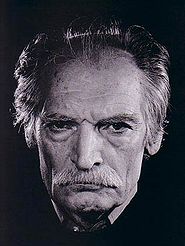- Mahmoud Dowlatabadi
-
Mahmoud Dowlatabadi 
Born Sabzevar, Iran Occupation Novelist Literary movement Persian literature Notable work(s) Kalidar
Missing SoluchMahmoud Dowlatabadi (Persian: محمود دولتآبادی) (born 1940 in Dowlatabad, Sabzevar[1]) is an Iranian writer and actor. He is known as a realist writer of stories of rural life, in which he largely draws on his own experiences.
Contents
Biography
He was born in Dowlatabad, a village in the Sabzevar, north-western part of the Khorasan Province, Iran, and spent his youth helping his father with farming and tending the flocks, and reading tales of Persian folklore. He attended high school in Tehran but failed to attain a degree. He later joined the Anahita Drama Group. In 1975, he was arrested and spent a year in prison.
Dowlatabadi started writing in the 1960s and has published several novels, novellas, short story collections and plays for theatre. Hist first story, The Pite of Night, was published in 1962 in the Anahita Literary Magazine. Other significant works include his 1968 novel The Tale of Baba Sobhan, which was made into a motion picture by Masud Kimiai entitled "Khak" (Earth/dust; 1972) and his magnum opus, Kalidar, which he wrote between 1977 and 1984.
Awards and honors
- 2011: Man Asian Literary Prize, longlist, The Colonel
Translations
- In Norway, Den tomme plassen etter Soluch is translated into Norwegian by N. Zandjani. Oslo, Solum forlag 2008.
Notes
References
- Interview with Mahmoud Dowlatabadi
- About Mahmoud Dowlatabadi
- Interview with Mahmoud Dowlatabadi
- Interview with Mahmoud Dowlatabadi (in Persian), Radio Zamaneh
Persian literature Old Middle Ayadgar-i Zariran · Counsels of Adurbad-e Mahrspandan · Dēnkard · Book of Jamasp · Book of Arda Viraf · Karnamak-i Artaxshir-i Papakan · Cube of Zoroaster · Dana-i_Menog_Khrat · Shabuhragan of Mani · Shahrestanha-ye Eranshahr · Bundahishn · Greater Bundahishn · Menog-i Khrad · Jamasp Namag · Pazand · Dadestan-i Denig · Zadspram · Sudgar Nask · Warshtmansr · Zand-i Vohuman Yasht · Drakht-i Asurig · Bahman Yasht · Shikand-gumanic VicharClassical 900s–1000sRudaki · Abu-Mansur Daqiqi · Ferdowsi (Shahnameh) · Abu Shakur Balkhi · Bal'ami · Rabia Balkhi · Abusaeid Abolkheir (967–1049) · Avicenna (980–1037) · Unsuri · Asjadi · Kisai Marvazi · Ayyuqi1000s–1100sBābā Tāher · Nasir Khusraw (1004–1088) · Al-Ghazali (1058–1111) · Khwaja Abdullah Ansari (1006–1088) · Asadi Tusi · Qatran Tabrizi (1009–1072) · Nizam al-Mulk (1018–1092) · Masud Sa'd Salman (1046–1121) · Moezi Neyshapuri · Omar Khayyām (1048–1131) · Fakhruddin As'ad Gurgani · Ahmad Ghazali · Hujwiri · Manuchehri · Ayn-al-Quzat Hamadani (1098–1131) · Uthman Mukhtari · Abu-al-Faraj Runi · Sanai · Banu Goshasp · Borzu-Nama · Afdal al-Din Kashani · Abu'l Hasan Mihyar al-Daylami · Mu'izzi · Mahsati Ganjavi1100s–1200sHakim Iranshah · Suzani Samarqandi · Ashraf Ghaznavi · Faramarz Nama · Shahab al-Din Suhrawardi (1155–1191) · Adib Sabir · Am'aq · Najm-al-Din Razi · Attār (1142–c.1220) · Khaghani (1120–1190) · Anvari (1126–1189) · Faramarz-e Khodadad · Nizami Ganjavi (1141–1209) · Fakhr al-Din al-Razi (1149–1209) · Kamal al-din Esfahani · Shams Tabrizi (d.1248)1200s–1300sAbu Tahir Tarsusi · Najm al-din Razi · Awhadi Maraghai · Shams al-Din Qays Razi · Baha al-din Walad · Nasīr al-Dīn al-Tūsī · Baba Afdal al-Din Kashani · Fakhr al-din Araqi · Mahmud Shabistari (1288–1320s) · Abu'l Majd Tabrizi · Amir Khusro (1253–1325) · Saadi (Bustan / Golestān) · Bahram-e-Pazhdo · Zartosht Bahram e Pazhdo · Rumi · Homam Tabrizi (1238–1314) · Nozhat al-Majales · Khwaju Kermani · Sultan Walad1300s–1400sIbn Yamin · Shah Ni'matullah Wali · Hafez · Abu Ali Qalandar · Fazlallah Astarabadi · Nasimi · Emad al-Din Faqih Kermani1400s–1500s1500s–1600sVahshi Bafqi (1523–1583) · 'Orfi Shirazi1600s–1700sSaib Tabrizi (1607–1670) · Kalim Kashani · Hazin Lāhiji (1692–1766) · Saba Kashani · Bidel Dehlavi (1642–1720)1700s–1800sNeshat Esfahani · Forughi Bistami (1798–1857) · Mahmud Saba Kashani (1813–1893)Contemporary Persian and Classical Persian are the same language, but writers since 1900 are classified as contemporary. At one time, Persian was a common cultural language of much of the non-Arabic Islamic world. Today it is the official language of Iran, Tajikistan and one of the two official languages of Afghanistan. Categories:- Iranian novelists
- Iranian short story writers
- 1940 births
- Living people
- People from Sabzevar
- Iranian writer stubs
Wikimedia Foundation. 2010.
